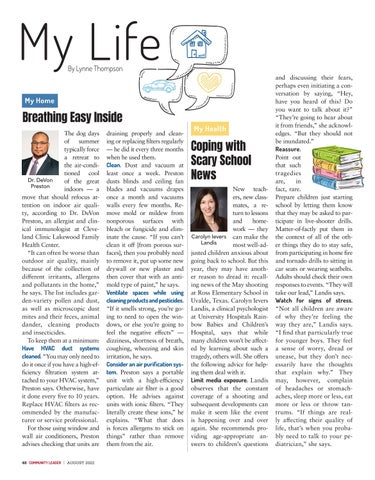My Life By Lynne Thompson
My Home
Breathing Easy Inside The dog days of summer typically force a retreat to the air-conditioned cool Dr. DeVon of the great Preston indoors — a move that should refocus attention on indoor air quality, according to Dr. DeVon Preston, an allergist and clinical immunologist at Cleveland Clinic Lakewood Family Health Center. “It can often be worse than outdoor air quality, mainly because of the collection of different irritants, allergens and pollutants in the home,” he says. The list includes garden-variety pollen and dust, as well as microscopic dust mites and their feces, animal dander, cleaning products and insecticides. To keep them at a minimum: Have HVAC duct systems cleaned. “You may only need to do it once if you have a high-efficiency filtration system attached to your HVAC system,” Preston says. Otherwise, have it done every five to 10 years. Replace HVAC filters as recommended by the manufacturer or service professional. For those using window and wall air conditioners, Preston advises checking that units are 48 COMMUNITY LEADER | AUGUST 2022
draining properly and cleaning or replacing filters regularly — he did it every three months when he used them. Clean. Dust and vacuum at least once a week. Preston dusts blinds and ceiling fan blades and vacuums drapes once a month and vacuums walls every few months. Remove mold or mildew from nonporous surfaces with bleach or fungicide and eliminate the cause. “If you can’t clean it off [from porous surfaces], then you probably need to remove it, put up some new drywall or new plaster and then cover that with an antimold type of paint,” he says. Ventilate spaces while using cleaning products and pesticides. “If it smells strong, you’re going to need to open the windows, or else you’re going to feel the negative effects” — dizziness, shortness of breath, coughing, wheezing and skin irritation, he says. Consider an air purification system. Preston says a portable unit with a high-efficiency particulate air filter is a good option. He advises against units with ionic filters. “They literally create these ions,” he explains. “What that does is forces allergens to stick on things” rather than remove them from the air.
My Health
Coping with Scary School News New teachers, new classmates, a return to lessons and homework — they Carolyn Ievers can make the Landis most well-adjusted children anxious about going back to school. But this year, they may have another reason to dread it: recalling news of the May shooting at Ross Elementary School in Uvalde, Texas. Carolyn Ievers Landis, a clinical psychologist at University Hospitals Rainbow Babies and Children’s Hospital, says that while many children won’t be affected by learning about such a tragedy, others will. She offers the following advice for helping them deal with it. Limit media exposure. Landis observes that the constant coverage of a shooting and subsequent developments can make it seem like the event is happening over and over again. She recommends providing age-appropriate answers to children’s questions
and discussing their fears, perhaps even initiating a conversation by saying, “Hey, have you heard of this? Do you want to talk about it?” “They’re going to hear about it from friends,” she acknowledges. “But they should not be inundated.” Reassure. Point out that such tragedies are, in fact, rare. Prepare children just starting school by letting them know that they may be asked to participate in live-shooter drills. Matter-of-factly put them in the context of all of the other things they do to stay safe, from participating in home fire and tornado drills to sitting in car seats or wearing seatbelts. Adults should check their own responses to events. “They will take our lead,” Landis says. Watch for signs of stress. “Not all children are aware of why they’re feeling the way they are,” Landis says. “I find that particularly true for younger boys. They feel a sense of worry, dread or unease, but they don’t necessarily have the thoughts that explain why.” They may, however, complain of headaches or stomachaches, sleep more or less, eat more or less or throw tantrums. “If things are really affecting their quality of life, that’s when you probably need to talk to your pediatrician,” she says.














